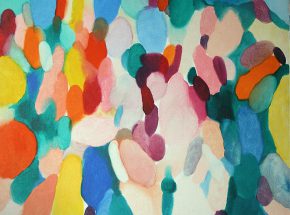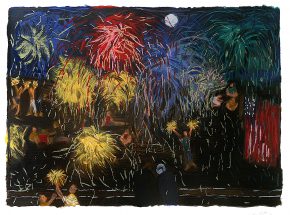

Elizabeth Murray was born in Chicago in 1940. She earned a BFA at the Art Institute of Chicago and an MFA from Mills College in Oakland, California. A pioneer in painting, Murray’s distinctively shaped canvases break with the art-historical tradition of illusionistic space in two-dimensions. Jutting out from the wall and sculptural in form, Murray’s paintings and watercolors playfully blur the line between the painting as an object and the painting as a space for depicting objects. Her still lifes are reminiscent of paintings by masters such as Cézzane, Picasso, and Matisse; however, like her entire body of work, Murray’s paintings rejuvenate old art forms. Breathing life into domestic subject matter, Murray’s paintings often include images of cups, drawers, utensils, chairs, and tables. These familiar objects are matched with cartoonish fingers and floating eyeballs—macabre images that are as nightmarish as they are goofy. Taken in as a whole, Murray’s paintings are abstract compositions rendered in bold colors and multiple layers of paint. But the details of the paintings reveal a fascination with dream states and the psychological underbelly of domestic life. The recipient of many awards, Murray received the Skowhegan Medal in Painting in 1986, the Larry Aldrich Prize in Contemporary Art in 1993, and a John D. and Catherine T. MacArthur Foundation Award in 1999. Her work is featured in many collections, including the Walker Art Center, the Museum of Modern Art, the Solomon R. Guggenheim Museum, the Art Institute of Chicago, and the Museum of Contemporary Art, Los Angeles. Elizabeth Murray lived and worked in New York, and died in August 2007.
www.pbs.org/art21/artists/murray/




